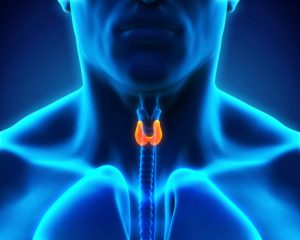There is an important gland in the body, which is most widely known for managing our metabolic rate. We’re referring to the thyroid, and this butterfly-shaped gland assists many of our vital organs like the heart, brain and lungs.
There are many illnesses that can affect the thyroid and disrupt normal bodily functions. One in particular is called thyroiditis.
Thyroiditis refers to inflammation of the thyroid gland. Here are the different types of thyroiditis:
5 types of thyroiditis
Hashimoto’s disease: This is the most common form of thyroiditis. The immune system begins to attack the thyroid gland and can lead to hypothyroidism (underactive thyroid, which leads to slower growth and mental development).
Postpartum thyroiditis: Occurs when the thyroid becomes inflamed after giving birth. The result is thyrotoxicosis – high amounts of thyroid hormones in the blood. This can speed up the metabolic rate and disrupt regular bodily functions. It is not a common form.
Subacute granulomatous thyroiditis: This form of thyroiditis can result in pain as well as respiratory infections.
Subacute lymphocytic thyroiditis: This form of thyroiditis can also be referred to as silent thyroiditis, because there is little to no pain when the thyroid gets bigger. Typically, women go through a short period of hyperthyroidism followed by what can become permanent hypothyroidism. This disorder is most common on postpartum women.
Drug-induced thyroiditis: This is commonly caused when drugs interfere with the thyroid.
Causes of thyroiditis
 Generally the cause of thyroiditis is the immune system attacking the thyroid, which leads to inflammation. This in turn can leave damage to the cells in the thyroid. Thyroiditis can be referred to as an autoimmune disease, similar to juvenile diabetes or rheumatoid arthritis.
Generally the cause of thyroiditis is the immune system attacking the thyroid, which leads to inflammation. This in turn can leave damage to the cells in the thyroid. Thyroiditis can be referred to as an autoimmune disease, similar to juvenile diabetes or rheumatoid arthritis.
It is unclear as to why a person’s body may produce antibodies that attack the thyroid, but it’s been speculated that thyroiditis runs in families.
Signs and symptoms of thyroiditis
 Different types of thyroiditis present themselves differently, but there are some common signs and symptoms to look out for. They include:
Different types of thyroiditis present themselves differently, but there are some common signs and symptoms to look out for. They include:- Firm or enlarged thyroid
- Enlarged and painful thyroid – pain may travel up the jaw to the ears
- Cool, dry skin
- Slowed heartbeat (fewer than 60 beats per minute)
- Swelling around the eyes
- Hoarseness
- Slowed reflexes
- Reduced appetite
- Fatigued and lethargic
- Slight fever
- Constipation
- Intolerance to heat
- Rapid heartbeat, anxiety and sweating
- Weight loss
Postpartum thyroiditis in particular can be difficult to diagnose because it occurs within a year after childbirth. Often the symptoms are attributed to the stress of having a newborn or postpartum depression.
Nutrition and prevention
Medication, and in rare occurrences, surgery may be used for treatment. But to supplement medical treatments it’s important to maintain proper nutrition. For starters you want to eat foods that can lower thyroid activity. These include broccoli, cabbage, spinach and kale – essentially dark leafy greens. Be mindful, though, if your thyroid is underactive you may need to avoid these foods.
Furthermore you will want to avoid foods that are processed, contain sugar, wheat, caffeine and alcohol, which can all worsen the condition. One other caution is the consumption of soy. Some research shows soy may interfere with thyroid hormones, so speak to your doctor if you’re concerned.
References:
http://www.thyroid.org/what-is-thyroiditis/
http://umm.edu/health/medical/altmed/condition/thyroiditis
http://www.endocrineweb.com/conditions/thyroid/thyroiditis
http://www.mayoclinic.org/diseases-conditions/hashimotos-disease/basics/definition/con-20030293
http://www.mayoclinic.org/diseases-conditions/postpartum-thyroiditis/basics/definition/con-20035474
http://www.nlm.nih.gov/medlineplus/ency/article/000375.htm
http://www.nlm.nih.gov/medlineplus/ency/article/000388.htm
http://www.ncbi.nlm.nih.gov/
http://umm.edu/health/medical/altmed/condition/thyroiditis
http://www.endocrineweb.com/conditions/thyroid/thyroiditis
http://www.mayoclinic.org/diseases-conditions/hashimotos-disease/basics/definition/con-20030293
http://www.mayoclinic.org/diseases-conditions/postpartum-thyroiditis/basics/definition/con-20035474
http://www.nlm.nih.gov/medlineplus/ency/article/000375.htm
http://www.nlm.nih.gov/medlineplus/ency/article/000388.htm
http://www.ncbi.nlm.nih.gov/

No comments:
Post a Comment